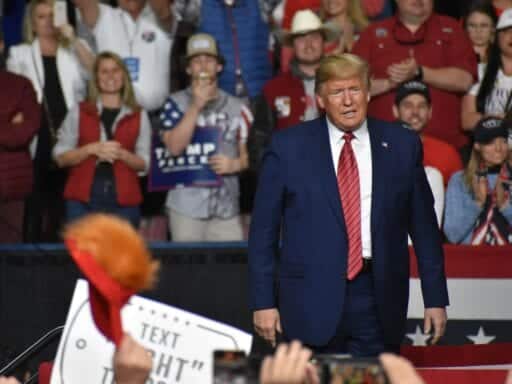Amid reports of new US Covid-19 cases, Trump complains, “the Democrats are politicizing the coronavirus.”
The night before the South Carolina Democratic primary, President Donald Trump appeared in that state at a rally in North Charleston, where he appeared to downplay the threat of the novel coronavirus — and Covid-19, the disease it causes — by decrying it as a “hoax.”
Speaking before a crowd of thousands, Trump accused Democrats of politicizing the spread of the Covid-19, which has killed almost 3,000 people worldwide and infected at least 15 people (not counting those who were diagnosed with Covid-19 following their exposure to to the virus aboard the Diamond Princess cruise ship) in the US to date.
“One of my people came up to me and said, ‘Mr. President, they tried to beat you on Russia, Russia, Russia. That didn’t work out too well. They couldn’t do it.’ They tried the impeachment hoax,” said Trump. “And this is their new hoax.”
Here’s Trump at his rally tonight in South Carolina dismissing worries about the coronavirus as the “new hoax” pic.twitter.com/Q58d7dI1cb
— Aaron Rupar (@atrupar) February 29, 2020
“The Democrats are politicizing the coronavirus,” Trump continued, and mocked the party by saying “can’t even count their votes in Iowa,” referring to the technological and human errors that led to a delay in the release of Iowa caucuses results. In response to those who have criticized his response to the virus’ spread, he said that his administration’s closing of US borders have kept the number of infections low domestically.
“We have 15 people in this massive country, and because of the fact that we went early, we went early, we could have had a lot more than that,” he said, referencing the number of Centers for Disease Control and Prevention (CDC) confirmed cases at the time of his rally. “We’re doing great. Our country is doing great.”
But whether the country is doing great is a matter of some debate.
“The data over the last week, and the spread in other countries, has raised our level of concern and our level of expectation we’re going to have community spread here,” Nancy Messonnier, director of the National Center for Immunization and Respiratory Diseases at CDC said last week. “It’s not a question of if this will happen, but when this will happen, and how many people in this country will have severe illnesses.”
And by Friday, there were four reported “community spread” cases — that is, cases in which the point of exposure to the virus is unknown — identified within the US.
If those cases are confirmed by the CDC, they would bring the number of infections identified within the US from the 15 Trump cited in his rally to 19.
There have also been concerns that Trump had been too slow to appoint someone to manage the US response to the virus. As Vox’s Matt Yglesias wrote Tuesday, “Infectious disease response necessarily involves balancing a range of considerations from throughout government public health agencies and critical aspects of economic and foreign policy. That’s why in fall 2014, the Obama administration appointed Ron Klain to serve as “Ebola czar” — a single official in charge of coordinating the response across the government.”
Wednesday, Trump attempted to answer critiques such as these by tasking Vice President Mike Pence with leading the government’s efforts to combat the coronavirus — however, he said the vice president would not be the coronavirus czar. Other officials, including the diplomat and HIV and AIDS expert Dr. Deborah Birx and Health and Human Services Secretary Alex Azar, have been assigned to help lead the response as well.
Overall, despite the president’s claims otherwise, criticism of the administration’s coronavirus response is not a partisan hoax, but a bipartisan effort to ensure the country is ready to face the novel virus.
Congressional Republicans and Democrats alike have called the Trump administration’s request for $2.5 billion in outbreak response funds inadequate. And at a hearing Tuesday, one Republican senator called the disease a potential existential threat.
“So money should not be an object,” said Sen. Richard Shelby of Alabama. “We should try to contain and eradicate this as much as we can.”
It is true that the spread of Covid-19 in the US is outpaced by the disease’s spread in other countries — the rates of infection in Iran, South Korea and Italy in particular are surging — but public health officials have warned that the coronavirus nevertheless needs to be taken seriously.
On Friday, for instance, the World Health Organization declared the coronavirus risk to be “very high at a global level.”
In response to these concerns, other countries have stepped up their response to the virus. The French government on Saturday announced that gatherings of more than 5,000 people would be banned after its health ministry confirmed 19 new cases on Friday. Italy has cancelled sporting events and implemented mandatory quarantines in some communities. Facebook and Amazon are among the companies cancelling domestic events requiring travel.
Meanwhile, Trump argues he has the coronavirus issue well in hand, telling reporters Friday, “We’ll just keep doing a good job. We’re ordering a lot of supplies, we’re ordering a lot of elements that frankly we wouldn’t be ordering if it wasn’t something like this.”
“We’re ordering a lot of supplies. We’re ordering a lot of, uh, elements that frankly we wouldn’t be ordering unless it was something like this. But we’re ordering a lot of different elements of medical.” — Trump on the coronavirus pic.twitter.com/id6YLzbmRE
— Aaron Rupar (@atrupar) February 28, 2020
And to his supporters, he argues — without evidence — that he would be doing an even better job, if not for his political rivals.
Author: Anya van Wagtendonk
Read More



